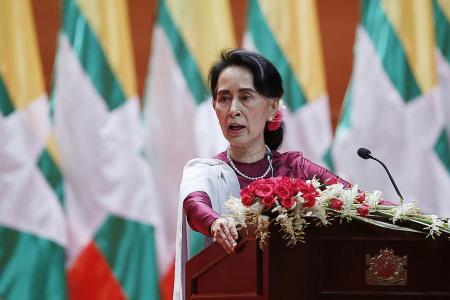Suu Kyi: We'll act on human rights abuses
But embattled Myanmar civilian leader offers no solutions to ethnic cleansing claims in Rohingya crisis
NAYPYIDAW, MYANMAR: Aung San Suu Kyi said yesterday she does not fear global scrutiny over the Rohingya crisis, pledging to hold human rights violators to account and to resettle some of the 410,000 Muslims who have fled army operations in her country.
In an address timed to pre-empt likely censure of Myanmar at the UN General Assembly in New York - delivered entirely in English and aimed squarely at an international audience - she called for patience and understanding of the unfurling crisis in her "fragile democracy".
But she offered no solutions to what the UN calls "ethnic cleansing" in Rakhine state, where army-led operations have driven Muslim Rohingya from their homes, and refused to point the finger at the men in uniform.
Rights group Amnesty International said the Nobel peace laureate was "burying her head in the sand" over documented army abuses and claims of rape, murder and the systematic clearing of scores of villages.
Inside Myanmar, supporters say the 72-year-old leader lacks the authority to rein in the military, which ran the country for 50 years and only ceded limited powers to her civilian government.
"She is trying to claw back some degree of credibility with the international community, without saying too much that will get her in trouble with the (military) and Burmese people who don't like the Rohingya in the first place," said Mr Phil Robertson of Human Rights Watch.
Communal violence has torn through Rakhine state since Rohingya militants staged deadly attacks on police posts on August 25.
An army-led campaign then left scores dead and sent hundreds of thousands of Rohingya fleeing mainly Buddhist Myanmar into Bangladesh.
In her 30-minute speech, Ms Suu Kyi reached out to critics who have condemned her failure to speak up for the stateless Rohingya.
Myanmar stood ready "at any time", she said, to repatriate refugees in accordance with a "verification" process agreed with Bangladesh in the early 1990s.
"Those who have been verified as refugees from this country will be accepted without any problems," she added.
In less than a month, just under half of Rakhine's one-million-strong Rohingya minority has poured into Bangladesh, where they now languish in overcrowded refugee camps.
It was not immediately clear how many would qualify to return.
But the subject of their claims to live in Myanmar is at the heart of a toxic debate about the Muslim group, who are denied citizenship by the state and considered to be illegal immigrants from Bangladesh.
Ms Suu Kyi's repatriation pledge "is new and significant", said Mr Richard Horsey, an independent analyst based in Myanmar, explaining it would in principle allow for the return of those who can prove residence in Myanmar - rather than citizenship.
Ms Suu Kyi insisted army "clearance operations" finished on Sept 5.
But AFP reporters have seen homes on fire in the days since then, while multiple testimonies from refugees arriving in Bangladesh suggests those operations have continued.
Rights monitors and Rohingya refugees say the army - often flanked by ethnic Rakhine mobs - systematically attacked Muslims and torched their villages.
Without blaming any single group, Ms Suu Kyi promised to punish anyone found guilty of abuses "regardless of their religion, race or political position".
Myanmar's army acts without civilian oversight and makes all security decisions, including its notorious scorched earth counter-insurgency operations. - AFP
Get The New Paper on your phone with the free TNP app. Download from the Apple App Store or Google Play Store now



